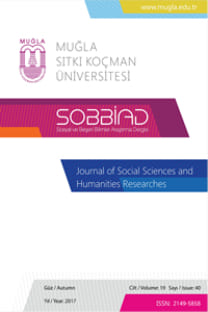Elinizdeki makalede Descartes’ın karşı karşıya kaldığı fiziksel dünyanın varlığı sorununun bazılarının iddia ettiği gibi Descartes’ın ‘kötü ruh varsayımı’ndan kaynaklanan salt yöntemsel bir sorun olmadığını bilakis Descartes’ın idealar kuramının bir sonucu olan gerçek bir bilgi sorunu olduğu tezini savundum. Descartes, ideaların zihnimizdeki temsili nesneler olduğunu iddia eder; bu ise fiziksel nesnelerin varlığına doğrudan ulaşmayı yani Descartes’ın deyimiyle onların açık ve seçik bilgisini elde etmeyi imkansız kılarak fiziksel dünyanın varlığını sorunlu hale getirir. Bu makalede önce Descartes’ın idealar kuramını daha sonra ise fiziksel dünyanın varlığı sorununun bu kuramın bir sonucu olduğunu göstermeye çalıştım. Bunu yaparken kısaca Descartes’ın fiziksel dünyanın varlığı argümanına da değındim. Son olarak bu argümanın sonuçlarının Descartes’ın genel epistemolojik varsayımlarıyla uyuşmadığını belirttim.
Descartes’ Theory Of Ideas And The Existence Of The Physical World
In this paper I argue that the problem of the existence of the physical world that Descartes faces in his epistemology is not just a methodological problem raised by the so-called ‘Evil Demon Hypothesis’, as some have argued, but rather it is a real epistemological problem which appears to be a consequence of Descartes’ theory of ideas. Descartes’ conception of ideas as representative objects in the mind, by not allowing a direct access to, that is, preventing a clear and distinct perception of, the existence of the physical objects, makes the existence of the physical world problematic in the context of the Cartesian philosophy. In the paper, I first examine Descartes’ theory of ideas, and then try to show how the problem of the existence of the physical world arises as a result of this theory. In doing this I briefly consider Descartes’ ‘proof’ of the existence of the physical world, which does not seem to be consistent with Descartes’ fundamental epistemological assumptions, especially his principle of clear and distinct perception.
- ISSN: 2149-5858
- Yayın Aralığı: Yılda 2 Sayı
- Başlangıç: 2000
- Yayıncı: Mugla Sitki Kocman University
Sayıdaki Diğer Makaleler
Türkçe’nin Eğitimi ve Öğretiminde Oyun Tekerlemelerinin Yeri ve Önemi
Bölgesel Rekabet Gücünün Geliştirilmesinde Verimliliğin Rolü
Liberalism And The Right To Culture
Örgütsel Güvenin Oluşturulmasına İlişkin Unsurlar ve Bir Değerlendirme
Tarihsel Süreç İçinde Kentleşme Olgusu ve Muğla Örneği
